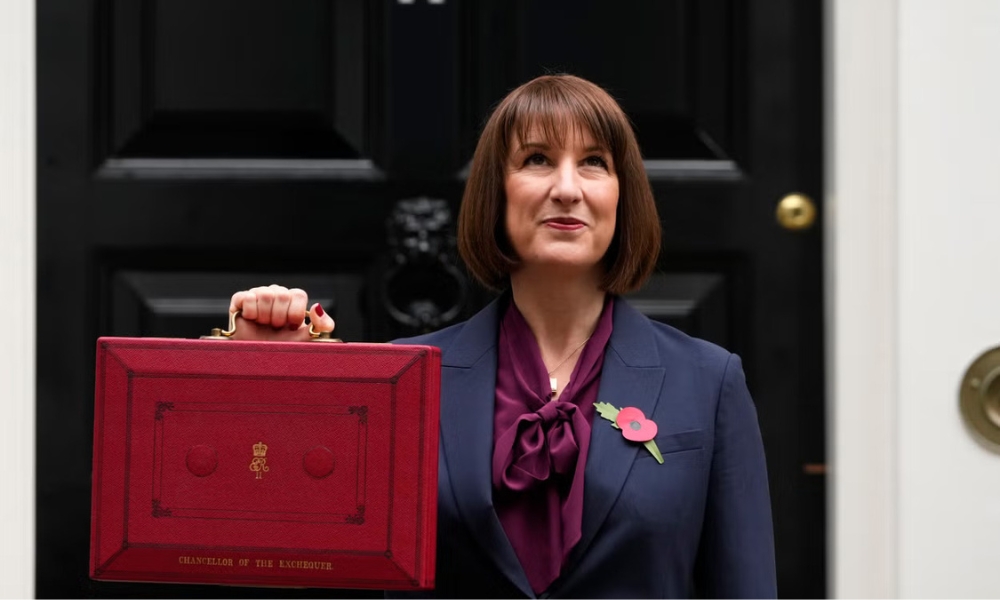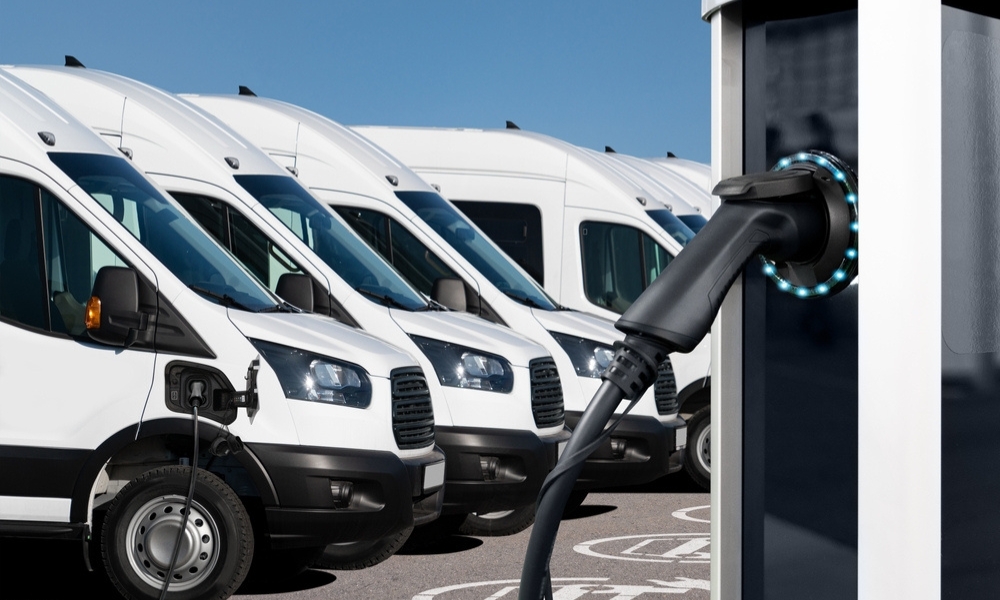
Image Credit: The Independent
With the announcement of the Autumn Budget, we’ve seen the arrival of several policies that are likely to carry big implications for the automotive and fleet sector.
To read the full Budget, visit the government website.
One of the positive takeaways from the Autumn Budget 2024 is the highlight of an increased focus on EVs as the future of transport in the UK. Notably, the government has broadened the differential in Vehicle Excise Duty (VED) First Year Rates between EVs and internal combustion engine (ICE) vehicles. From April 2025, first-year VED rates for ICE vehicles will double, adding further pressure on businesses to consider electrification. A nominal £10 first-year VED rate for zero-emission vehicles until 2030 has been set.

It also extends the 100% First Year Allowances for zero-emission cars and EV charge points through an additional year. These policies create a financial environment favouring businesses transitioning to electric fleets and requiring extensive charging infrastructure to support the shift.
The Budget has also set Benefit-in-Kind rates (BiK) for company cars up to 2030, bringing stability for fleet managers planning electric fleet transitions. BiK electric vehicle rates will gradually increase, moving to 7% in 2028-29 and 9% in 2029-30. Hybrid rates are expected to grow more in line with ICE vehicles. For plug-in hybrids (PHEVs), a bigger rise will be from 5% to 18% between 2027-28 and 2028-29. This brings clarity to businesses' planning for long-term fleet costs.
New draft legislation is set to address contrived car ownership schemes, which allow employers or third parties to sell a car to employees via loans with no repayment terms and only buy it back later under favourable terms. The government aims to close these loopholes, ensuring car ownership schemes stay fair and transparent, especially for businesses dependent on company car incentives.
To support the shift to electric vans, the Budget has extended the Plug-in Van Grant with an additional £120 million earmarked for 2025-26. This funding should bring down costs for businesses looking to expand their EV fleet with new electric vans while also fostering the development of wheelchair-accessible EVs. The continued availability of this grant can help offset the upfront cost of purchasing electric vans.

To account for inflation, the Autumn Budget outlined plans to update the Van Benefit Charge, car and van Fuel Benefit Charges in line with the Consumer Price Index (CPI) from April 2025. This adjustment will impact businesses providing company vehicles and fuel benefits, potentially increasing costs for those offering ICE or hybrid vehicles.
For many businesses looking to shift to EVs, the process remains complex. While the tax incentives and lower upfront costs are enticing, factors like vehicle range, charging accessibility, and overall fleet management complexity can still present hurdles. To mitigate this, we have developed our eStart solution that can assess your company's goals and support the smooth transition of your fleet to EVs.
SG Fleet is the only provider in the UK that offers both personal and business-lease-based salary sacrifice schemes, making accessing EVs easier than ever. Our Novalease scheme is our personal-lease solution, giving access to both zero and low-emission vehicles. It is a low-admin, zero-risk salary sacrifice solution that doesn’t require any setup costs.
This shows that businesses still relying on ICE vehicles aren’t being left behind. The extension of the fuel duty freeze and the temporary 5p reduction for a further year supports businesses still reliant on traditional vehicles. Though this measure benefits those with petrol and diesel vehicles, it underscores the temporary nature of fossil fuel dependency.
In the long run, businesses dependent on fleets will likely receive more encouragement to consider alternative fuels as part of their future planning. This temporary relief will save the average vehicle operator £59 in 2025-26, helping reduce operational costs for logistics, distribution, and other high-mileage sectors.
Another positive point from the Autumn Budget is the commitment to invest in infrastructure development, earmarking over £100 billion for capital investment across sectors, including transport. While not exclusive to the automotive and fleet industries, a substantial piece of this will likely bolster the country’s EV charging infrastructure.
Government initiatives to increase public EV infrastructure, paired with a National Wealth Fund, have been devised to encourage private sector investment to speed up EV adoption further.
Our eStart option can help businesses looking to upgrade their EV infrastructure and charging capability. As part of our business assessment, we review your existing site capability and ensure that you've got the necessary charge points and that they're in the right place.
To mitigate the taxation changes, many businesses must ensure that their fleets run efficiently. SG Fleet provides Fleetintelligence, a reporting and management system that enables access to details on any vehicle activity 24 hours a day. It's updated daily and has powerful analytical tools to give you the edge when developing strategic fleet policies and maximising efficiencies.
Beyond this, our in-house Motrak solution is a major telematics and in-vehicle CCTV provider. It's reliable and robust and helps you to manage your fleet efficiently. Building on more than 25 years of experience in GPS technology, we can bring you a flexible, intuitive, and cost-efficient package.
The Budget is increasing investment in R&D, which suggests potential gains for fleet technology, from fuel-efficient engines to smart logistics solutions and battery advancements. Businesses integrating innovative tech into their fleets might find new efficiencies through this investment, bringing down carbon emissions and operational costs.
The Budget also hints at further public and private partnerships. While this appears less concrete, it could expand public sector EV fleet usage, indirectly supporting the private sector’s access to advancements in fleet electrification.
One of the Autumn Budget's main thrusts is its taxation shift. Since their election campaign earlier this year, Labour’s front bench has focused on balancing public finances while encouraging the transition to more sustainable practices.
The government also announced increases to Heavy Goods Vehicle (HGV) VED rates and the HGV Levy in line with the Retail Price Index (RPI) starting in April 2025. These adjustments will affect operators with heavy-duty fleets, pushing for greater efficiencies within the sector as part of a broader goal of modernising road transport.
Although full expensing policies are currently limited to owning assets, the Autumn budget intends to extend this benefit to leasing and rental assets when economic conditions permit. Full expensing would be a big financial advantage for businesses using fleets, providing tax relief on new assets and encouraging investment in new, energy-efficient vehicles. While the policy remains uncertain, its potential implementation in the future is a welcome signal for businesses considering upgrading their fleet.
The Autumn Budget also impacts taxation for double-cab pickup vehicles. Starting from April 2025, double-cab pickups (DCPUs) with a payload of at least one tonne will be categorised as cars for certain tax purposes, which might increase the tax burden for businesses using these vehicles. However, existing capital allowance treatments and transitional BiK arrangements will remain available for pickups purchased, leased, or ordered before April 2025, allowing for a smoother transition for businesses that already operate such vehicles.
It will increase the employer NICs rate by 1.2 percentage points to 15%. Moreover, reducing the per-employee threshold from £9,100 to £5,000 will create significant cost adjustments for large businesses employing substantial vehicle-related staff. However, the government is taking action to offset this by boosting the Employment Allowance from £5,000 to £10,500, which should alleviate some of the financial burden on smaller employers.
The prospective changes to CGT might also impact fleet managers who look after vehicle asset disposals. With CGT going from 10% to 18% at the lower rate and from 20% to 24% at the higher rate, companies might find it more challenging to benefit from asset turnover strategies for capital growth.
In particular, this might influence businesses using vehicles as temporary assets, such as leasing or vehicle-sharing initiatives. Fleet-dependent businesses must now weigh their turnover decisions carefully to ensure asset disposals stay financially viable and advantageous.
At SG Fleet, we’re dedicated to helping your business navigate the automotive landscape. With years of expertise, we offer innovative solutions to streamline fleet operations, reduce costs, and support the transition to sustainable practices.
If you need support for employee benefits, fleet management, or broader advice, then contact your account manager or get in touch today. Our team is here to guide you every step of the way.

- Are EVs Viable in Rural Areas?
- How Can We Adapt Fleet Management to UK Mobility Trends?
- What the 2024 UK General Election Result Means for the Automotive Industry
- How Will the UK Government’s VETS Scheme Impact Fleet Customers?